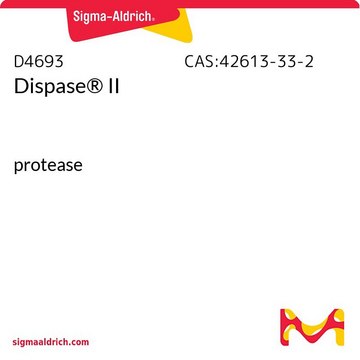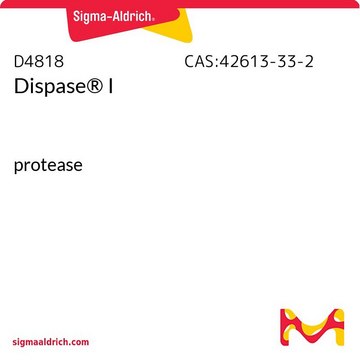B20223
Collagenase - DNase I - Dispase II blend
Tissue dissociation blend, lyophilized powder, suitable for cell culture
Sinónimos:
Clostridiopeptidase A, Clostridium histolyticum, DNase I, Deoxyribonuclease I, Deoxyribonucleate 5′-oligonucleotido-hydrolase, Dispase II, Protease from Bacillus polymyxa, collagenase, collagenase blend, enzyme blend, tissue dissociation blend
About This Item
Productos recomendados
Quality Level
form
lyophilized powder
specific activity
≥2 units/mL Dispase II
concentration
0.1 mg/mL (DNase)
1 mg/mL (collagenase)
technique(s)
cell culture | mammalian: suitable
shipped in
dry ice
storage temp.
-10 to -25°C
General description
Biochem/physiol Actions
Preparation Note
signalword
Danger
hcodes
Hazard Classifications
Eye Irrit. 2 - Resp. Sens. 1 - Skin Irrit. 2 - STOT SE 3
target_organs
Respiratory system
Storage Class
11 - Combustible Solids
wgk_germany
WGK 3
Certificados de análisis (COA)
Busque Certificados de análisis (COA) introduciendo el número de lote del producto. Los números de lote se encuentran en la etiqueta del producto después de las palabras «Lot» o «Batch»
¿Ya tiene este producto?
Encuentre la documentación para los productos que ha comprado recientemente en la Biblioteca de documentos.
Nuestro equipo de científicos tiene experiencia en todas las áreas de investigación: Ciencias de la vida, Ciencia de los materiales, Síntesis química, Cromatografía, Analítica y muchas otras.
Póngase en contacto con el Servicio técnico










